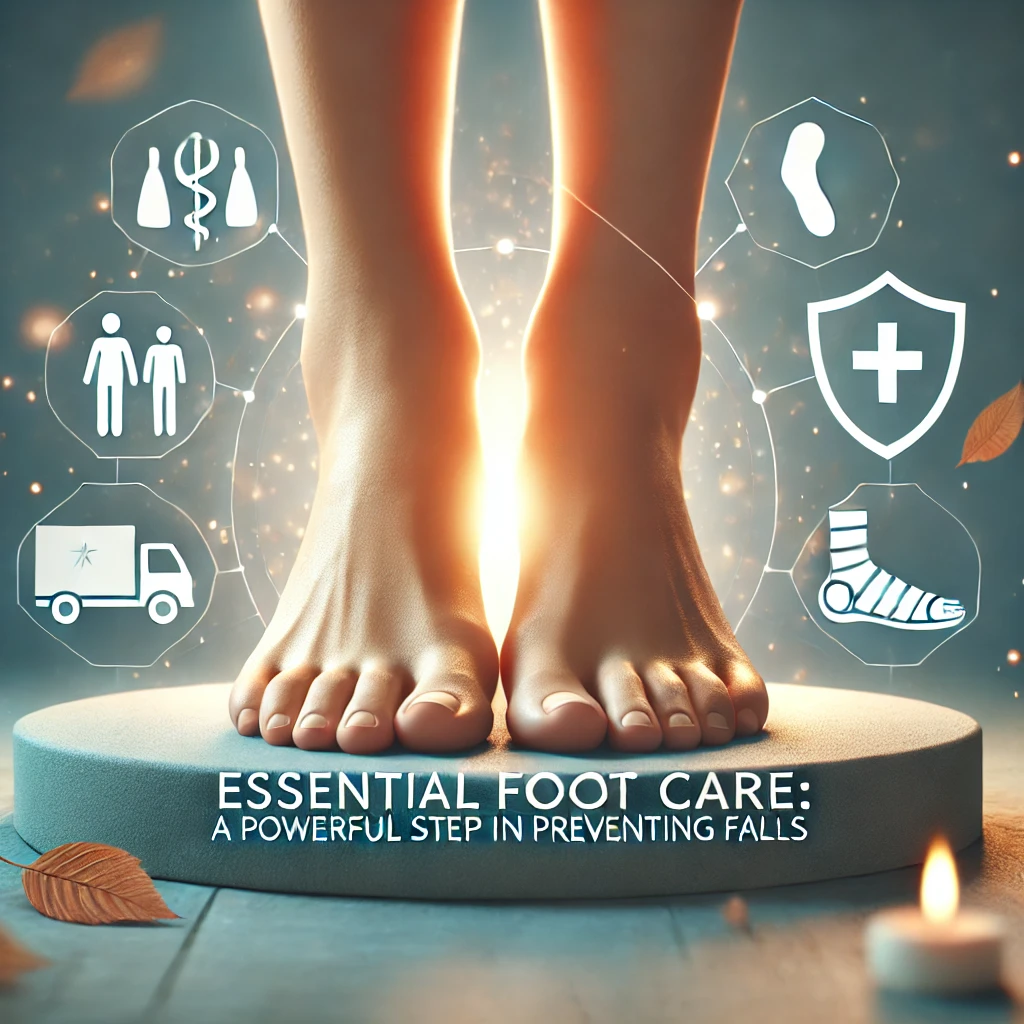Introduction
When we think about mental health, our minds often gravitate toward practices like mindfulness, therapy, or exercise. But have you ever considered how your feet factor into the equation? It might sound surprising, but the state of your feet plays a crucial role in your mental well-being. Let’s dive into how foot care and mental health are interconnected and why taking care of your feet should be part of your self-care routine.
Importance of Holistic Health

Mind-Body Connection Overview
Holistic health emphasizes the interconnectedness of the mind, body, and spirit. Your body is a complex system where each part contributes to overall wellness. Ignoring seemingly minor aspects, such as foot care, can disturb this balance, indirectly affecting mental health.
Overlooked Aspects of Foot Care
Feet often get the short end of the stick in self-care routines. Despite bearing the weight of our daily lives, we tend to neglect them. This neglect can lead to problems that, over time, influence how we feel mentally.
Role of Feet in Overall Health

Feet as the Foundation of Mobility
Your feet are the foundation of your body, supporting mobility and balance. Any discomfort or pain in your feet can restrict movement, making it challenging to lead an active life.
Impact of Poor Foot Health on Daily Life
When foot health declines, daily tasks like walking, standing, or exercising become harder. These limitations can lead to frustration, isolation, and, eventually, a negative impact on mental health.
How Foot Care Affects Mental Health
Chronic Foot Pain and Psychological Stress
Chronic foot pain doesn’t just hurt your body—it takes a toll on your mind too. Prolonged discomfort often leads to stress and anxiety. Imagine constantly battling pain with every step you take; it’s no wonder this can significantly weigh down your mental state.
- Connection Between Chronic Pain and Anxiety
Pain signals activate stress responses in the brain, leading to increased anxiety. Over time, this can escalate to feelings of helplessness. - Depression Linked to Limited Mobility
Restricted mobility caused by foot issues can result in social withdrawal and a loss of independence, two major contributors to depression.
The Impact of Foot Hygiene on Self-Esteem
How you perceive yourself is deeply tied to your mental health. If poor foot hygiene causes conditions like fungal infections or unpleasant odors, it can chip away at your self-confidence.
- Importance of Appearance in Mental Well-Being
Feet are often visible, especially in social settings or warmer months. Taking care of their appearance can boost your self-esteem. - Consequences of Neglecting Hygiene
Neglecting hygiene can lead to avoidable conditions like athlete’s foot or ingrown toenails, which can be painful and embarrassing.
Reflexology and Stress Relief

Reflexology is an ancient practice that links specific areas of the feet to other parts of the body. This therapeutic method has gained modern recognition for its stress-relief benefits.
Science Behind Reflexology
By applying pressure to certain zones on the feet, reflexology stimulates nerves and promotes relaxation, reducing cortisol levels and improving mood.
Benefits of Regular Reflexology Sessions
Regular reflexology sessions can alleviate tension, enhance circulation, and even improve sleep—all of which contribute to better mental health.
The Role of Lifestyle in Foot and Mental Health
Benefits of Physical Activity
When we talk about physical activity, we often focus on heart health or weight management. However, it plays a dual role in maintaining both foot health and mental well-being.
- Exercise for Foot Strength
Activities like walking, running, or yoga strengthen the muscles and ligaments in your feet. Stronger feet mean better balance and less likelihood of injury or strain, which can limit mobility and impact your mental health. - Exercise’s Role in Mental Health
Physical activity releases endorphins, the “feel-good” chemicals in the brain. Regular exercise also helps reduce stress, anxiety, and depression, creating a positive feedback loop where healthier feet encourage more activity, which in turn boosts mental health.
Diet and Nutritional Impact
Your diet doesn’t just affect your waistline; it plays a critical role in the health of your feet and your mental state.
- Foods that Promote Foot Health
A diet rich in calcium, vitamin D, and omega-3 fatty acids strengthens bones, reduces inflammation, and supports overall foot health. Leafy greens, nuts, fish, and dairy are excellent sources. - Mood-Boosting Nutrients
Nutrients like magnesium, found in bananas and almonds, can reduce stress and improve mental clarity. Foods high in antioxidants, such as berries and dark chocolate, also help combat oxidative stress, benefitting both your body and mind.
Practical Foot Care Tips for Better Mental Health

Taking care of your feet doesn’t have to be complicated or time-consuming. A few simple practices can go a long way in enhancing both foot health and mental well-being.
Regular Foot Check-Ups
Ignoring foot problems can lead to bigger health issues over time. Regular check-ups are a preventive measure worth considering.
- Importance of Podiatric Exams
Seeing a podiatrist ensures that minor issues like calluses or flat feet are addressed before they become major concerns. It’s like getting a mental health check-up but for your feet! - Early Detection of Issues
Many conditions, such as plantar fasciitis or bunions, are easier to treat when caught early. This proactive approach saves you from future discomfort and the mental stress of dealing with persistent pain.
Proper Footwear and Orthotics
The type of shoes you wear has a significant impact on your foot health, which in turn affects your overall mood and well-being.
- Choosing the Right Shoes
Invest in well-fitted, comfortable shoes that provide adequate arch support. Avoid shoes that are too tight or lack cushioning, as they can cause pain and exacerbate foot issues. - The Benefits of Custom Orthotics
Custom insoles are designed to address specific foot problems, reducing pain and improving posture. They’re an excellent solution for people with chronic foot conditions.
Maintaining Daily Foot Hygiene
Good foot hygiene isn’t just about keeping your feet clean; it’s a form of self-care that can uplift your mood and prevent infections.
- Step-by-Step Guide to Foot Care
Wash your feet daily with warm water and mild soap, dry them thoroughly (especially between the toes), and apply a moisturizer to prevent dryness and cracking. Don’t forget to trim your nails regularly to avoid ingrown nails. - Products that Promote Healthy Feet
Use products like antifungal powders, foot soaks, and comfortable socks made from breathable materials. These small investments can make a big difference in keeping your feet healthy and pain-free.
Conclusion
The relationship between foot care and mental health is often overlooked, but the connection is undeniable. Healthy feet allow us to move freely, maintain our independence, and engage in activities that boost our mental state. On the other hand, neglecting foot care can lead to physical discomfort, low self-esteem, and even mental health struggles.
By integrating simple foot care practices into your routine—like wearing proper footwear, maintaining hygiene, and seeking professional help when needed—you’re not just investing in your physical health but also your emotional and mental well-being. Remember, self-care starts from the ground up—literally.
FAQs
1. How does foot pain affect mental health?
Chronic foot pain can lead to stress, anxiety, and depression by limiting mobility and independence. It also activates the body’s stress response, making relaxation difficult.
2. Can reflexology genuinely relieve stress?
Yes, reflexology can relieve stress by stimulating nerves in the feet, promoting relaxation, and reducing cortisol levels. It’s a natural way to enhance mental well-being.
3. What are the best exercises for maintaining foot health?
Exercises like toe stretches, calf raises, and balance training are excellent for strengthening the feet. Walking and yoga are also great for improving flexibility and reducing stress.
4. How often should I see a podiatrist for optimal foot health?
It’s recommended to see a podiatrist at least once a year for a routine check-up, or more frequently if you experience persistent pain or other foot issues.
5. Are there specific foods that benefit both foot and mental health?
Yes, foods rich in calcium, vitamin D, and omega-3 fatty acids support foot health, while antioxidants and magnesium-rich foods improve mental clarity and reduce stress.







